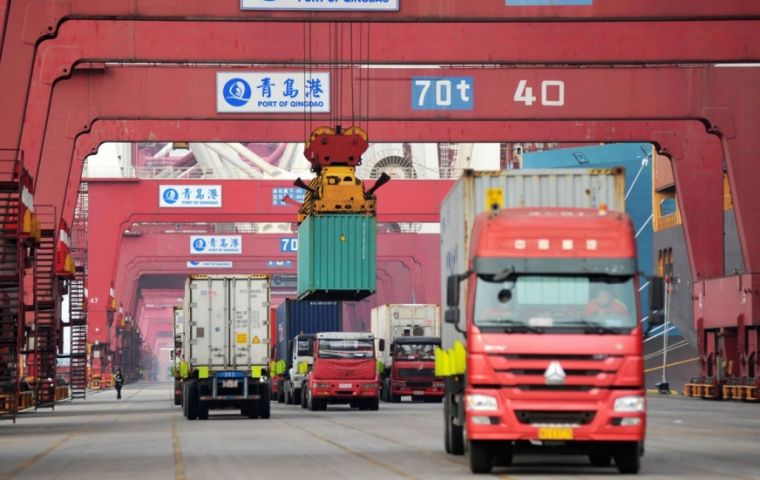MercoPress. South Atlantic News Agency
As March countdown clicks, UN warns about global implications of the US/China trade dispute
 United States plans to increase tariffs on Chinese goods if the two sides fail to make progress on a trade deal by 1 March
United States plans to increase tariffs on Chinese goods if the two sides fail to make progress on a trade deal by 1 March  US and China have a deadline of March first to strike a deal, or the US has said it will increase tariff rates on US$ 200bn worth of Chinese goods from 10% to 25%.
US and China have a deadline of March first to strike a deal, or the US has said it will increase tariff rates on US$ 200bn worth of Chinese goods from 10% to 25%. United Nations trade official has warned a US plan to raise tariffs on Chinese goods next month would have “massive” implications for the global economy. The US plans to increase tariffs on Chinese goods if the two sides fail to make progress on a trade deal by 1 March.
The comments followed a report by a UN trade agency on the impact of the US-China trade war. It said Asian countries are likely to suffer most from protectionism.
The US and China are locked in a damaging trade dispute that has seen both sides levy tariffs on billions of dollars worth of one another's goods. In December, both countries agreed to hold off on new tariffs for 90 days to allow for talks.
The US and China have a deadline of March first to strike a deal, or the US has said it will increase tariff rates on US$ 200bn worth of Chinese goods from 10% to 25%.
The UN Conference on Trade and Development (Unctad) has warned that there will be huge costs if the trade war escalates.
“The implications are going to be massive,” Pamela Coke-Hamilton, Unctad's head of international trade, said at a news conference. “The implications for the entire international trading system will be significantly negative.”
Smaller and poorer countries would struggle to cope with the external shocks, she said. The higher cost of US-China trade would prompt companies to shift away from current east Asian supply chains.
Unctad's report estimates that east Asian producers will be hit the hardest, with a projected US$ 160bn contraction in the region's exports. But it warns the effects could be felt everywhere.
“There'll be currency wars and devaluation, stagflation leading to job losses and higher unemployment and more importantly, the possibility of a contagion effect, or what we call a reactionary effect, leading to a cascade of other trade distortionary measures,” Ms Coke-Hamilton said.
The higher cost of US-China trade would prompt companies to shift away from current east Asian supply chains, but report suggests it's unlikely that US firms would pick up that business.
The study found that US firms will only pick up 6% of the US$ 250bn in Chinese exports that are subject to US tariffs. Of the approximately US$ 85bn in US exports that are subject to China's tariffs, only about 5% will be taken up by Chinese firms, the UN research shows.
The study found that European exports will grow by US$ 70bn, while Japan, Canada and Mexico will see exports increase by more than US$ 20bn each. Other countries that could benefit include Australia, Brazil, India, the Philippines and Vietnam, the report said.




Top Comments
Disclaimer & comment rulesCommenting for this story is now closed.
If you have a Facebook account, become a fan and comment on our Facebook Page!